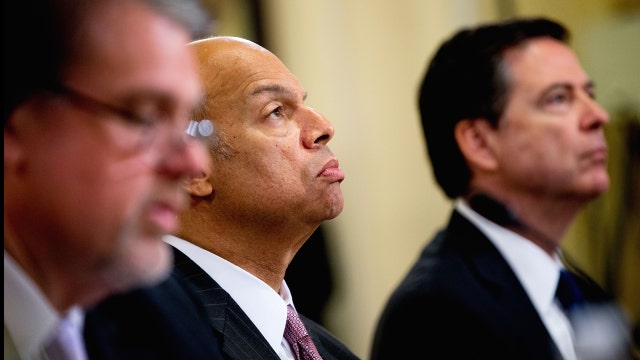Congress holds hearing on threats to the US
FBI, National Security directors testify on Capitol Hill
Top law enforcement and security officials cautioned Wednesday that bringing in 10,000 Syrian refugees as planned carries a terror risk, with Homeland Security Secretary Jeh Johnson acknowledging background checks can only do so much and "there is no risk-free process.”
“The good news is that we are better at [vetting] than we were eight years ago. The bad news is that there is no risk-free process,” Johnson said at a House Homeland Security Committee hearing.
The Obama administration has committed to bringing in 10,000 Syrian refugees in fiscal 2016, as part of a total 85,000 worldwide refugees.
However, at the hearing on “Worldwide Threats and Homeland Security Challenges,” officials said while they are confident about their vetting process, there is a risk in terms of screening refugees who have never crossed the intelligence radar.
“If the person has not crossed our radar screen, there will be nothing to query against so we do see a risk there,” FBI Director James Comey said.
“It is not a perfect process. There is a degree of risk attached to any screening and vetting process. We look to manage that risk as best we can,” Nicholas Rasmussen, director of the National Counterterrorism Center, said.
“We may have someone who is not on our radar and someone may choose to do something bad after they get here,” Johnson said. “We can only query against what we have collected, so if someone hasn’t made a ripple in the pond, we can check our databases until the cows come home but we have no record on that person.”
However, Johnson said the system in place is “a good system,” and noted that the process also includes a personal assessment for each refugee. “It’s not just simply what’s in a public record,” Johnson said.
The testimony reflects the challenge ahead for the administration, as it tries to respond to a global refugee crisis fueled by the Syrian civil war and other conflicts. Aid groups and other governments had urged the United States to accept more refugees, who mostly have fled to neighboring Middle Eastern countries and Europe, and the administration agreed to accept more.
Republican lawmakers continued to voice concerns at Wednesday's hearing.
“My concern is that you’re relying upon them and what they say or what they write out in an application and you can’t go beyond that,” Rep. Lamar Smith, R-Texas, said. “So you’re having to take their word for it.”
South Carolina Rep. Jeff Duncan said his constituents were "very concerned about our inability to vet properly the refugees that are coming."
“I just want to encourage you all … to rethink the resettlement of refugees in this country, especially in the numbers I’m hearing," Duncan said.
Addressing the ISIS threat more generally, FBI Director Comey also said that the number of Americans going abroad to join ISIS has fallen in recent months. Comey said the FBI is aware of six Americans trying to join the group in the last three-and-a-half months, in contrast to the approximately nine each month they were seeing before that.
However, he said he could not explain the reduction, and noted the group’s use of social media has allowed them to successfully “break the model” of terror recruitment.
“ISIS has used that ubiquitous social media to break the model and push into the United States into the pocket, onto the mobile devices, on troubled souls throughout our country in all 50 states, a twin message, ‘Come or Kill,’” Comey said.













































